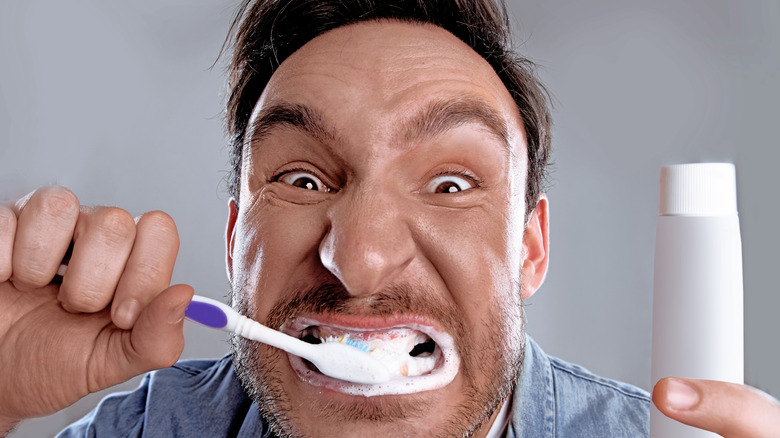You Might Be Flossing Your Teeth Entirely Wrong
To floss or not to floss, that is the question.
While some studies reveal that the benefits of flossing your teeth are inconclusive, the American Dental Association (ADA) remains a floss advocate, issuing a formal statement: "Cleaning between teeth removes plaque that can lead to cavities or gum disease from the areas where a toothbrush can't reach. Interdental cleaning is proven to help remove debris between teeth that can contribute to plaque build-up."
So, the answer to the flossing question — it couldn't hurt.
If you're already a flosser, you should be aware that you may be doing a few things wrong. For instance, you may be neglecting certain key areas of your mouth, such as alongside the teeth, as well as way back behind those molars. Also, be careful about irritating your gums — don't apply too much pressure with the floss (via Empire Dental).
Another way you might be missing out on the health benefits of flossing is by flossing at the wrong time of day. Neglecting to floss before bed can leave food particles on your teeth overnight. Also, make sure you're using the correct size floss on your teeth depending on the thickness needed, and be sure that the strand of floss you're using is not too short to do a thorough enough job (via The Healthy).
Other oral hygiene mistakes you may be making
Beyond flossing mistakes, when it comes to oral hygiene overall, there are a number of other common mistakes that dentists say you should avoid.
One of which, is drinking a sugary beverage in the middle of the day. "A 16-ounce can, can have upwards of almost 30 grams of sugar," says celebrity dentist, Dr. Jon Marashi (via NBC News). So if you're thinking of picking up a midday Coke, you may want to think twice. Dr. Marashi further states, "Sugars are carbohydrates that oral bacteria like to consume, and sugars are also acidic which can cause chemical erosion of your teeth."
New York City-based dentist, Dr. Inna Chern, tells NBC News that another common mistake is brushing too forcefully. "Aggressive scrubbing over time can cause enamel abrasion and gum recession, ultimately leading to sensitivity issues and tooth structure loss," she warns. If this sounds like you, consider a softer toothbrush or an electric toothbrush. And if you've had it with flossing and think mouthwash is a good alternative — think again. "Although mouthwash is a great add-on for any oral hygiene regimen, it does not take the place of the mechanical cleaning of those hard-to-reach spots in between and around the teeth," says Chern.
So if you're already flossing your teeth and incorporating other good oral hygiene habits — you're in great shape! Just make sure not to mitigate the benefits of your good practices with poor execution, and you'll have plenty to smile about.


